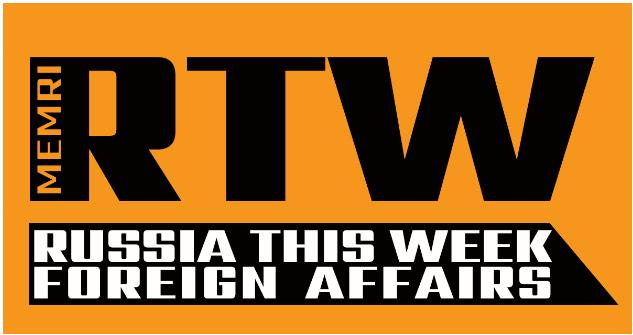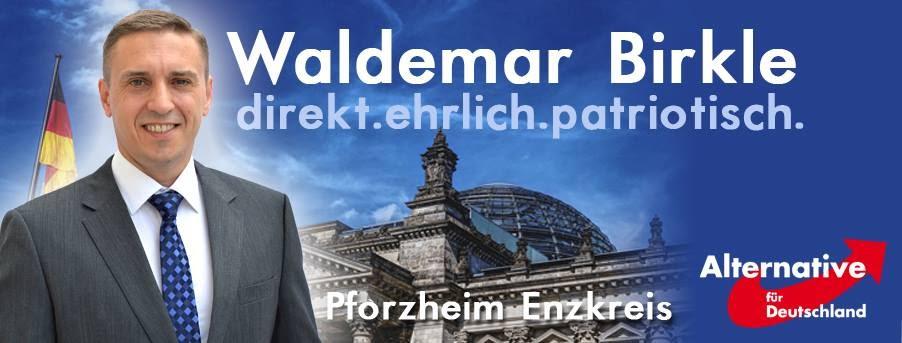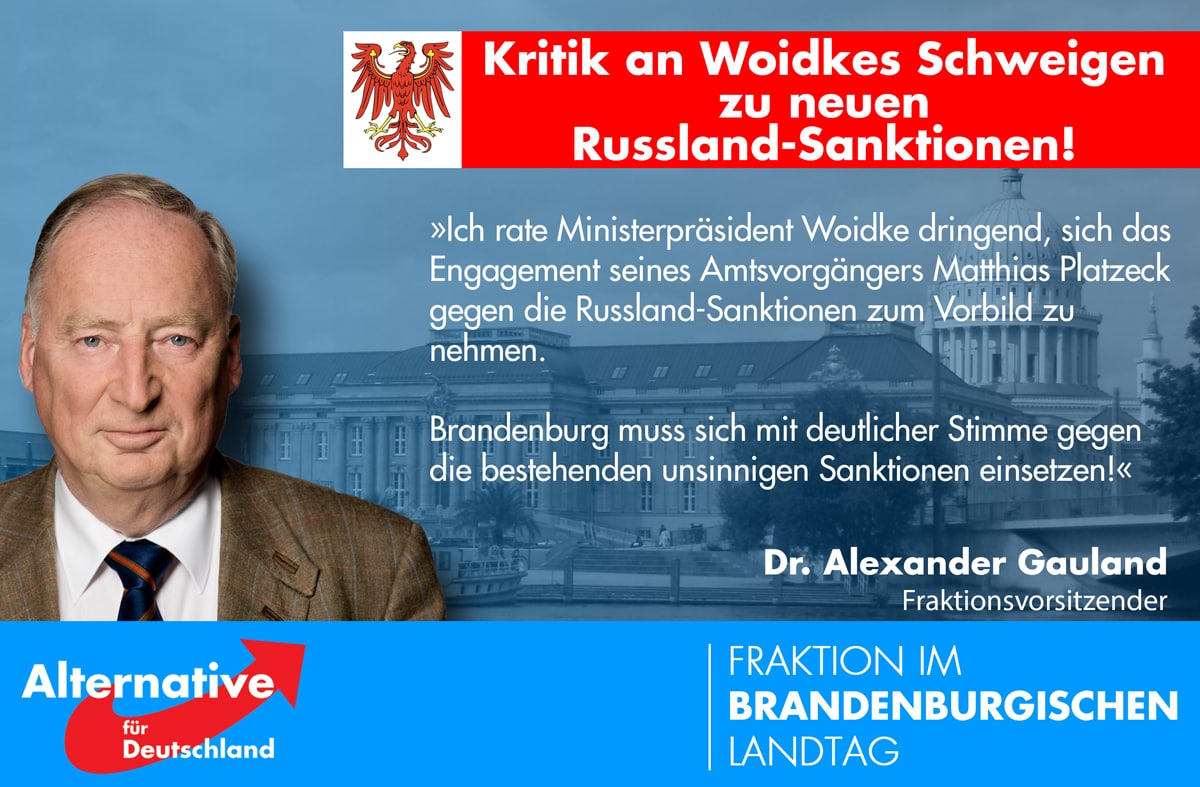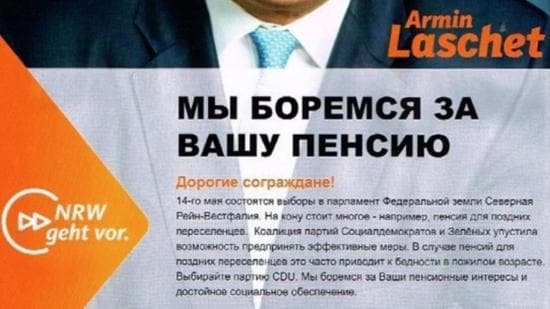Russia This Week – September 25, 2017
Russia This Week – September 25, 2017
Russia This Week is a weekly review by the MEMRI Russian Media Studies Project, covering the latest Russia-related news and analysis from media in Russia, the Caucasus, Central Asia, and Eastern Europe.

Quotes Of The Week
Last August, the far right party Alternative for Germany (AfD) held a “Russian congress” in Magdeburg (Saxony-Anhalt). During the congress, Russian German politician Waldemar Birkle, who was born in Kazakhstan, said:
“Germans of Russian origin, unlike the Turks, embody those German values now prone to mockery.”
(Kommersant.ru, September 24, 2017)

Waldemar Birkle (Source: Waldemar-birkle.de)
Alexander Gauland, deputy leader of the far right party AfD, said:
“Crimea will never return to Ukraine, sanctions will not help… it would be right if Crimea was recognized part of Russia… Russia is a power, we should involve it in building a new European order.”
(Tass.com, August 19, 2017)

AfD flyer quoting Gauland’s opposition to new sanctions on Russia. (Source: Afd-fraktion-brandenburg.de)
Pushkov’s Tweet Storm
Russian Senator Alexey Pushkov (@Alexey_Pushkov) wrote in his Twitter account: “Germany: a shift towards a [political] alternative. Merkel’s party received less than planned while the AfD got more than the forecasts predicted. This is the price of an open doors policy.”
(Twitter.com/alexey_pushkov, September 24, 2017)

(Source: Twitter.com/alexey_pushkov, September 24, 2017)
He also tweeted: “Germany : Merkel wins, but her win is not unequivocal. Germans want a serious adjustment of policy. The success of the AfD, the leftists and the SPD is quite significant.
(Twitter.com/alexey_pushkov, September 24, 2017)
In The News
Federal Elections In Germany
AfD’s Electoral Success
Federal elections were held in Germany on September 24. German chancellor Angela Merkel won a fourth term with 33 percent of the vote, but this represented the smallest share of the vote for the Christian Democrats (CDU) since the 1940s. The Social Democrats (SPD) led by Martin Schulz got a 20.5 percent. The real surprise was the 12.6 percent of the votes for the far-right anti-immigration, Eurosceptic party Alternative for Germany (AfD), which became the third political force in Germany. Merkel will now have to cobble a coalition together, a task rendered still harder by the SPD’s announcement that it is headed for opposition.
During the electoral campaign the Russian-German population was considered as a key factor in catapulting the AfD into the Bundestag for the first time. In Pforzheim, a city in the south-western state of Baden-Wurttemberg, with a sizable Russian-German population, the AfD won 24 per cent of the vote in the 2016 local elections. In Pforzheim’s suburb, Haidach, where nearly half the residents have a Soviet household background, the AfD received more than the 50 per cent of the votes.
The German media outlet Deutsche Welle reported that fifteen Russian-German organizations wrote an open letter, complaining about the “very one-sided portrayal of ethnic Germans from Russia as a particularly motivated group of voters” of the right-wing party AfD. The letter voiced indignation over this treatment: “We are not the AfD, not the CDU, and not Putin’s fifth column! We are individuals like all other citizens of our country!” (Dw.de, September 17, 2017, See full article)
On August 31, 2016, the German daily Die Zeit published an article showing that 30 percent of AfD’s supporters and 31 percent of Germany’s leftwing democratic socialist Die Linke’s supporters (which include former East German Communists) trust Putin more than Merkel.
See MEMRI Special Dispatch No. 6608, Russia This Week – Part II- September 5-12, 2016, September 12, 2016.
See also MEMRI Special Dispatch No. 6669, ‘Moskovskij Komsomolets’ Columnist: ‘How The Chancellor Of Germany Became A Hostage Of The Minsk Process And What Is In Store For Her’, November 7, 2016.
The Russian-German Electorate
On September 22, the Russian media outlet Gazeta.ru wrote an article, titled “Russians and the Bundestag.” In the article, Russian journalist Olga Gulina reported that the Russian-German population (3-3.5 million of 61.9 million eligible voters in Germany) used to vote for the CDU/CSU alliance. Their loyalty to the CDU was motivated by the policy of the former Christian Democratic Chancellor Helmut Kohl, who reunited Germany and was especially solicitous towards the refugees whom he claimed who bore the consequences of WWII and their integration constituted a major victory of the German state and society.
The emigrants also received automatic German citizenship and a host of other benefits including recognition of their professional and academic qualifications and accumulated pension rights. The Greens and the SPD considered the Russian-Germans to be the ancestral fiefdom of the Christian Democrats and didn’t compete for their vote. However, that situation changed this year when the AfD decided to aggressively compete for their vote, by forming a network of Russian speaking propagandists, distributing Russian campaign literature and printing the party manifesto in Russian.
According to Gazeta.ru, the Christian Democrats overslept on their Russian electorate and remembered it extremely late. They did not devote the same organizational efforts and materials targeted at Russian speakers particularly in the key 45-50 age bracket. According to Gazeta.ru, the aging of the German electorate is a factor pushing it to the right and this applies to Russian speakers as well..
The article doubts that foreign policy towards Russia played a major role in the decision of Russian speakers. The parties with the exception of the Left Party made more frequent mention of relations with Turkey than with Russia. The Left called for the removal of the U.S. and NATO infrastructure and bitterly attacked the sanctions policy. Afd sufficed with a call for widening and deepening ties and removal of sanctions. The SPD claimed that peace and security in Europe were possible only with Russia, impossible without Russian and unrealistic against Russia. Even the CDU called for implementing the Minsk agreements and moving on to dialogue with Russia.
(Gazeta.ru, September 22, 2017)
Flyers in Russian
It is worth noting that all German main parties have been distributing flyers in Russian, targeting the Russian-German electorate. However, the AfD’s flyers in Russian were unique in assailing the outgoing government’s liberal immigration policy to Germany with controversial messages.

Afd poltical advertisement in Russian. Caption: “Protect your children from the uncontrolled immigration consequences. Protect your children from getting [sexually] perverse education in schools” (Source: Facebook.com/ayder.muzhdabaev, Ayder Muzhdabaev is a Crimean Tatar, former deputy in chief of Mk.ru, who fled to Ukraine.)

AfD’s poster in Russian. Caption: “Do not change your opinion; change the policy” (Source: facebook.com/afd.hamburg)

An AfD Russian-language poster titled “Together for Our Germany” (Source: Twitter.com)

CDU flyer “We Fight for Your Pension” targeted at Russian speakers in North Rhine-Westphalia (Source: Handelsblatt.com, May 5, 2017)

Hannelore Kraft, an SPD politician, who served as North Rhine-Westphalia’s Minister President from 2010 until 2017 appears on a pamphlet titled “Our Plan for North Rhine-Westphalia”. (Source: Wz.de, May 9, 2017)
News In Brief:
- Saudi King’s ‘historic’ visit to Russia on October 4-7 will reflect strong ties – Saudi Foreign Minister (Sputniknews.com, September 24, 2017, See full article)
- Russia steps up race with Saudi Arabia to pipe more oil to China (Arabnews.com, September 22, 3017, See full article)
- Rosneft’s gas project in Iraqi Kurdistan sparks concerns (Tass.com, September 19, 2017; See full article)
- Russian lieutenant-general killed in ISIS shelling near Deir ez-Zor, Syria (Rt.com, September 24, 2017)
- Menendez, Rubio Ask Trump Administration to Clarify Efforts to Prevent Rosneft’s Potential Acquisition of PdVSA and Citgo (Menendez.senate.gov, September 19, 2017; See full article)
- Morgan Freeman declares ‘war’ on Russia (Meduza.io, September 19, 2017; See full article)
- This article is republished with permission from our friends at The Middle East Media Research Institute.
Utah Standard News depends on the support of readers like you.
Good Journalism requires time, expertise, passion and money. We know you appreciate the coverage here. Please help us to continue as an alternative news website by becoming a subscriber or making a donation. To learn more about our subscription options or make a donation, click here.
To Advertise on UtahStandardNews.com, please contact us at: ed@utahstandardnews.com.


Comments - No Responses to “Russia This Week – September 25, 2017”
Sure is empty down here...